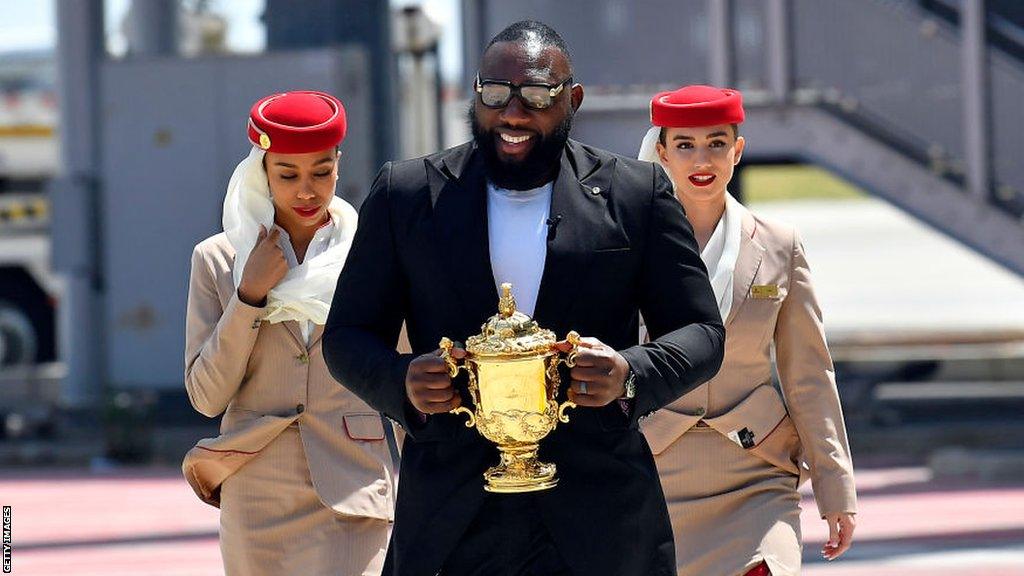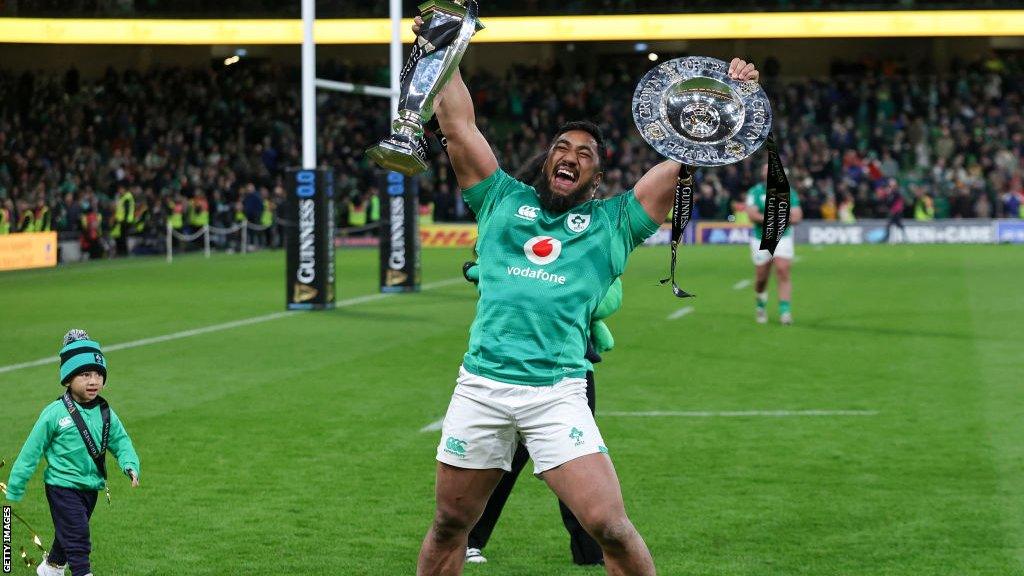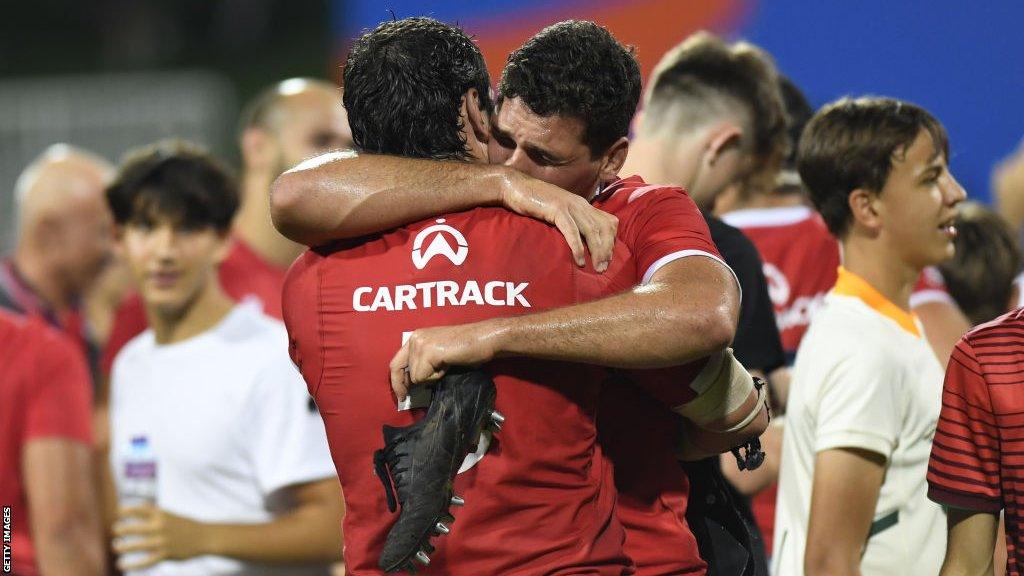Rugby World Cup begins with a uniquely close clutch of contenders
- Published
- comments

Former South Africa prop Tendai Mtawarira delivers the Williams Webb Ellis trophy to France back in March
Rugby World Cup: Pool A - France v New Zealand |
|---|
Venue: Stade de France Date: Friday, 8 September Kick-off: 20:15 BST |
Coverage: Listen to live commentary on BBC Radio 5 Live, BBC Sounds and online; follow text commentary on the BBC Sport website and app. |
The tipsters are safe for now.
Artificial intelligence may make us all redundant in the end, but asked this week who was going to win the Rugby World Cup, it sat on the firewall.
Considering form, history and the rest, Opta's supercomputer simulated the tournament 10 million times. Yet, still it was unable to meaningfully split a four-strong clutch of contenders.
Ireland - reigning Grand Slam champions, historic Kiwi conquerors - were spat out as marginal favourites, with a 21.7% likelihood of lifting the William Webb Ellis Trophy on 28 October.
Hosts France, humming with belief and a sense of destiny, were on 21.4%.
Defending champions South Africa and perennial powerhouses New Zealand followed close behind on 20.5% and 20.2% respectively.
They are a formidable quartet. Never before has a World Cup teetered so tantalisingly. As the megabytes expended proved, you can make a compelling case for all and absolutely no guarantees about what follows.
Ireland have cohesion and cunning, backed by Andy Farrell's doorstop of a playbook, as thick, intricately plotted and full of deception as a Dickens novel.
Johnny Sexton, their 38-year-old totem, is dancing for the last time, with his rugby career ending whenever Ireland's campaign does. Backed by Dan Sheehan, Hugo Keenan, Caelan Doris, Mack Hansen, Garry Ringrose and world player of the year Josh van der Flier it is undoubtedly his best, as well as final, chance of glory.

Ireland centre Bundee Aki celebrates Ireland's Grand Slam-sealing win over England in March
There is no obvious weakness beyond a lack of experience at the business end of this tournament - Ireland, infamously, have never made it beyond the quarter-finals, in nine previous campaigns.
France have been deprived of fly-half Romain Ntamack, who ruptured his anterior cruciate ligament last month. But Matthieu Jalibert, his replacement, has a similar buccaneering streak and the services of his captain and world's best scrum-half Antoine Dupont close at hand. A silky backline is matched by a steely pack, who marry piano-lifter heft with the hands of concert-grade ivory-tinklers.
South Africa have added another dimension to their crash-and-bash stereotype, with the play-making skills of Manie Libbok and Damian Willemse unleashing Kurt Lee-Arendse and Cheslin Kolbe more regularly. A win over New Zealand at Twickenham in their final warm-up match last week was an ominous statement of their intent to retain what is theirs.
And, that defeat apart, New Zealand, for once neither champions nor leading favourites, are coming to the boil nicely. They trumped the rest of the southern hemisphere in this year's Rugby Championship and in wings Will Jordan and Mark Telea have electrifying threat out wide.
So, any one of four? Wake us up come the semi-finals?
Perhaps, if not for a draw as misshapen as a rugby ball itself.
For not entirely clear logistical reasons, the pools were pulled in December 2020 - nearly three years before the tournament's start.
As if that wasn't enough, the basis for the draw's seedings was even older - drawn from January 2020's world rankings.
Back then, England and Wales were safely ensconced in the world's top four. Ireland were fifth. France were seventh.
It has skewed the show. There are two routes to the top of the world game. One wild with peril, the other mild with mediocrity.
Scotland's team is perhaps the finest in a generation. Their back-row depth is such that Hamish Watson, a British and Irish Lion against South Africa two years ago, may well be on the bench.
But pitched into a pool with Ireland and South Africa, their hopes of a decent run have been badly compromised.
By contrast England, for whom expectations have been chilled by three defeats in four warm-up games after a third successive deflating Six Nations, can afford to lose their opener to Argentina (a very real possibility given the Pumas' success at Twickenham last year) and still qualify.
Wales are attempting to bridge the gap between a generation of golden oldies and some promising youngsters with Jac Morgan and Dewi Lake - the pick of the new crop - as co-captains.
If they can see off a talented Fiji side and an Eddie Jones-led Australia that has ditched some of their own established names in search of consistency, top spot in Pool C is there for them.
However results go on this safer side of the draw, two of Argentina, England, Wales, Australia, or perhaps Fiji will be 80 minutes from the final. A pair of leftfield candidates for the title are guaranteed on the penultimate weekend.
As ever, there are fascinating sub-plots aplenty.
Back in July 2022, Chile thrillingly conquered the United States 52-51 in a two-legged qualification play-off to secure a debut appearance at 'A teetering World Cup poised to thrill'the tournament.

Portugal's play-off win over the United States means they return to the tournament for the first time in 16 years
Four months later Portugal scrum-half Samuel Marques landed a last-gasp penalty to deny the US once again and return his nation to the tournament for the first time since 2007.
The celebrations after those upsets - like those that accompanied Uruguay's win over Fiji at Japan 2019 or Japan overturning South Africa in Brighton four years earlier - show the tournament's capacity to shock as well as awe.
This edition will also be filled with intrigue over a Tonga side studded with former All Blacks, an enterprising Japan team attempting to build on a home World Cup and first quarter-final appearance and whether Georgia can realise their best chance of making the last eight.
There are and will be problems.
The club game is stretched close to breaking point in England and Wales - two of its heartlands. Rugby union's American push, with the United States hosting the World Cup in 2031, has stalled. In Australia, the stage for the 2027 tournament, the sport has to fight ever harder for prominence.
On the pitch, the clampdown on tackle height and the resulting blizzard of cards will affect matches. The breakdown laws are difficult for even a seasoned fan to define and understand. Reducing the risk of repeated head injuries, which is behind both, is an existential challenge the sport can't afford to fail.
But, on Friday evening, there will be a sweet spot. Under the Parisian lights, in front of Stade de France's 80,000 and millions around the world, somewhere between the last notes of La Marseillaise and the first utterings of the haka, as 80 minutes and seven weeks lie before us, for a moment everything will be right in the world and the World Cup.

The lives of three strangers with nothing in common collide: A deliciously dark tale, full of dupes, deceptions and delusions
What harm does vaping do to teenagers?: Panorama investigates the recent vaping phenomenon and its potential risks
